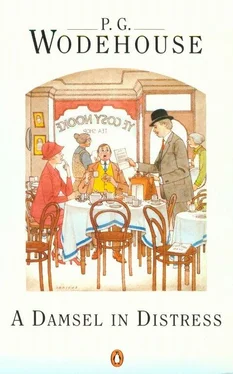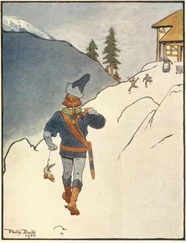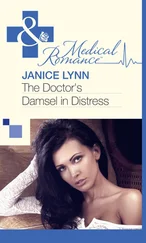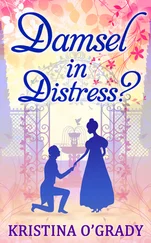“That poem was written by a very clever man who married one of my ancestresses. He ran away with her from this very castle in the seventeenth century.”
“Lor’“, said Albert as a concession, but he was still interested n the hornet.
“He was far below her in the eyes of the world, but she knew what a wonderful man he was, so she didn’t mind what people said about her marrying beneath her.”
“Like Susan when she married the pleeceman.”
“Who was Susan?”
“Red-’eaded gel that used to be cook ‘ere. Mr. Keggs says to ‘er, ‘e says, ‘You’re marrying beneath you, Susan’, ‘e says. I ‘eard ‘im. I was listenin’ at the door. And she says to ‘im, she says, ‘Oh, go and boil your fat ‘ead’, she says.”
This translation of a favourite romance into terms of the servants’ hall chilled Maud like a cold shower. She recoiled from it.
“Wouldn’t you like to get a good education, Albert,” she said perseveringly, “and become a great poet and write wonderful poems?”
Albert considered the point, and shook his head.
“No, m’lady.”
It was discouraging. But Maud was a girl of pluck. You cannot leap into strange cabs in Piccadilly unless you have pluck. She picked up another book from the stone seat.
“Read me some of this,” she said, “and then tell me if it doesn’t make you feel you want to do big things.”
Albert took the book cautiously. He was getting a little fed up with all this sort of thing. True, ‘er ladyship gave him chocolates to eat during these sessions, but for all that it was too much like school for his taste. He regarded the open page with disfavour.
“Go on,” said Maud, closing her eyes. “It’s very beautiful.”
Albert began. He had a husky voice, due, it is to be feared, to precocious cigarette smoking, and his enunciation was not as good as it might have been.
“Wiv’ blekest morss the flower-ports Was-I mean were-crusted one and orl; Ther rusted niles fell from the knorts That ‘eld the pear to the garden-worll. Ther broken sheds looked sed and stringe; Unlifted was the clinking latch; Weeded and worn their ancient thatch Er-pon ther lownely moated gringe, She only said ‘Me life is dreary, ‘E cometh not,’ she said.”
Albert rather liked this part. He was never happy in narrative unless it could be sprinkled with a plentiful supply of “he said’s” and “she said’s.” He finished with some gusto.
“She said – I am aweary, aweary, I would that I was dead.”
Maud had listened to this rendition of one of her most adored poems with much the same feeling which a composer with an over-sensitive ear would suffer on hearing his pet opus assassinated by a schoolgirl. Albert, who was a willing lad and prepared, if such should be her desire, to plough his way through the entire seven stanzas, began the second verse, but Maud gently took the book away from him. Enough was sufficient.
“Now, wouldn’t you like to be able to write a wonderful thing like that, Albert?”
“Not me, m’lady.”
“You wouldn’t like to be a poet when you grow up?”
Albert shook his golden head.
“I want to be a butcher when I grow up, m’lady.”
Maud uttered a little cry.
“A butcher?”
“Yus, m’lady. Butchers earn good money,” he said, a light of enthusiasm in his blue eyes, for he was now on his favourite subject. “You’ve got to ‘ave meat, yer see, m’lady. It ain’t like poetry, m’lady, which no one wants.”
“But, Albert,” cried Maud faintly. “Killing poor animals. Surely you wouldn’t like that?”
Albert’s eyes glowed softly, as might an acolyte’s at the sight of the censer.
“Mr. Widgeon down at the ‘ome farm,” he murmured reverently, “he says, if I’m a good boy, ‘e’ll let me watch ‘im kill a pig Toosday.”
He gazed out over the water-lilies, his thoughts far away. Maud shuddered. She wondered if medieval pages were ever quite as earthy as this.
“Perhaps you had better go now, Albert. They may be needing you in the house.”
“Very good, m’lady.”
Albert rose, not unwilling to call it a day. He was conscious of the need for a quiet cigarette. He was fond of Maud, but a man can’t spend all his time with the women.
“Pigs squeal like billy-o, m’lady!” he observed by way of adding a parting treasure to Maud’s stock of general knowledge. “Oo! ‘Ear ‘em a mile orf, you can!”
Maud remained where she was, thinking, a wistful figure. Tennyson’s “Mariana” always made her wistful even when rendered by Albert. In the occasional moods of sentimental depression which came to vary her normal cheerfulness, it seemed to her that the poem might have been written with a prophetic eye to her special case, so nearly did it crystallize in magic words her own story.
“With blackest moss the flower-pots Were thickly crusted, one and all.”
Well, no, not that particular part, perhaps. If he had found so much as one flower-pot of his even thinly crusted with any foreign substance, Lord Marshmoreton would have gone through the place like an east wind, dismissing gardeners and under-gardeners with every breath. But—
“She only said ‘My life is dreary, He cometh not,’ she said. She said ‘I am aweary, aweary. I would that I were dead!”
How exactly—at these moments when she was not out on the links picking them off the turf with a midiron or engaged in one of those other healthful sports which tend to take the mind off its troubles—those words summed up her case.
Why didn’t Geoffrey come? Or at least write? She could not write to him. Letters from the castle left only by way of the castle post-bag, which Rogers, the chauffeur, took down to the village every evening. Impossible to entrust the kind of letter she wished to write to any mode of delivery so public—especially now, when her movements were watched. To open and read another’s letters is a low and dastardly act, but she believed that Lady Caroline would do it like a shot. She longed to pour out her heart to Geoffrey in a long, intimate letter, but she did not dare to take the risk of writing for a wider public. Things were bad enough as it was, after that disastrous sortie to London.
At this point a soothing vision came to her—the vision of George Bevan knocking off her brother Percy’s hat. It was the only pleasant thing that had happened almost as far back as she could remember. And then, for the first time, her mind condescended to dwell for a moment on the author of that act, George Bevan, the friend in need, whom she had met only the day before in the lane. What was George doing at Belpher? His presence there was significant, and his words even more so. He had stated explicitly that he wished to help her.
She found herself oppressed by the irony of things. A knight had come to the rescue—but the wrong knight. Why could it not have been Geoffrey who waited in ambush outside the castle, and not a pleasant but negligible stranger? Whether, deep down in her consciousness, she was aware of a fleeting sense of disappointment in Geoffrey, a swiftly passing thought that he had failed her, she could hardly have said, so quickly did she crush it down.
She pondered on the arrival of George. What was the use of his being somewhere in the neighbourhood if she had no means of knowing where she could find him? Situated as she was, she could not wander at will about the countryside, looking for him. And, even if she found him, what then? There was not much that any stranger, however pleasant, could do.
She flushed at a sudden thought. Of course there was something George could do for her if he were willing. He could receive, despatch and deliver letters. If only she could get in touch with him, she could—through him—get in touch with Geoffrey.
Читать дальше







